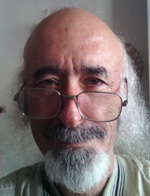
CHIAYI CITY, Taiwan — There’s so much dreary and depressing news in the papers and on TV these days about the so-called ”climate emergency” and the ”climate crisis.” Article after article, op-ed after op-ed, it’s a never-ending drumbeat of dystopian news and I’m tired of it.
Sure, I’m one of the people who coined and promoted the cli-fi genre of novels and movies over the past 10 years, but at the same time, I’m not in the pessimist camp. I’m a born optimist.
Here is an example of what I mean.
When Jewish climate activists were asked how they talk to their kids about runaway climate change, one told a reporter: “I certainly don’t want them to be as anxious and full of dread as I am as an adult. But we talk about it, sure. It’s possible their life expectancy will be shortened by climate change.”
“I talk with them openly about the issues ahead of them because I think pushing the issues away and out of sight is only going to serve to make them into strange, warped people,” they shared. “At the same time, one’s job as a parent is to be one’s children’s shell until they’re able to go into the world as vulnerable but functional humans. I take that job seriously.”
“Look, climate change is the greatest problem of our time, the thing that is probably going to kill humanity,” the activist added. ”We’re standing on the edge of the cliff, there’s a hurricane blowing, and we’re whistling merrily into the wind. It feels to me as if there’s a sword of Damocles hanging over our heads. It often feels like the human future is closing down, becoming smaller and darker. How much time do we have left to turn things around with climate change? Ten, twenty, fifty years?”
Dr Steven Moffic, a psychiatrist in the Milwaukee area who is a longtime reader of San Diego Jewish World and whose son is a well-known rabbi in the Chicago area, read the first part of this article that you are reading now and wrote to me by email offering his view of things: “Hi Dan, I’m more on your side. Children need information that they can understand, they also need hope and optimism. Moreover, look at how they can provide leadership in example of 17-year-old Swedish activist Greta Thunberg.”
“There are some mental health professionals who think we should build resilience in communities because it is too late to stop the ravages of what I call climate instability. That may be of some help, but it also distracts us from prevention. Not only do we still need to work to globally get our governments in line, but also support any research that can provide new energy sources,” he added.
So are we really ”standing on the edge of the cliff”? Some say yes, some say no.
I’m sitting on the fence. You?
*
Dan Bloom is a freelance writer, inveterate web surfer, and climate change activist based in Taiwan. He can be reached via dan.bloom@sdjewishworld.com
Dan Bloom is a freelance writer, inveterate web surfer, and climate change activist based in Taiwan. He can be reached via dan.bloom@sdjewishworld.com
As a psychiatrist, I am a bit dismayed by some of the comments that Dan quotes from Jewish climate activists. Maybe they are getting burned out from their challenging endeavors with so many obstacles, but getting too pessimistic is almost a reverse denial of the reality of climate instability. The emotional key to all of this is to have the right amount of fear and anxiety, not too much that one is paralyzed by it, and not too little that one does nothing, sort of like the cereal in the Goldilocks and the Three Bears story, not too hot and not too cold. There really is no convincing climate projections that we still can’t do enough to begin to reverse course.
– Dr. Moffic